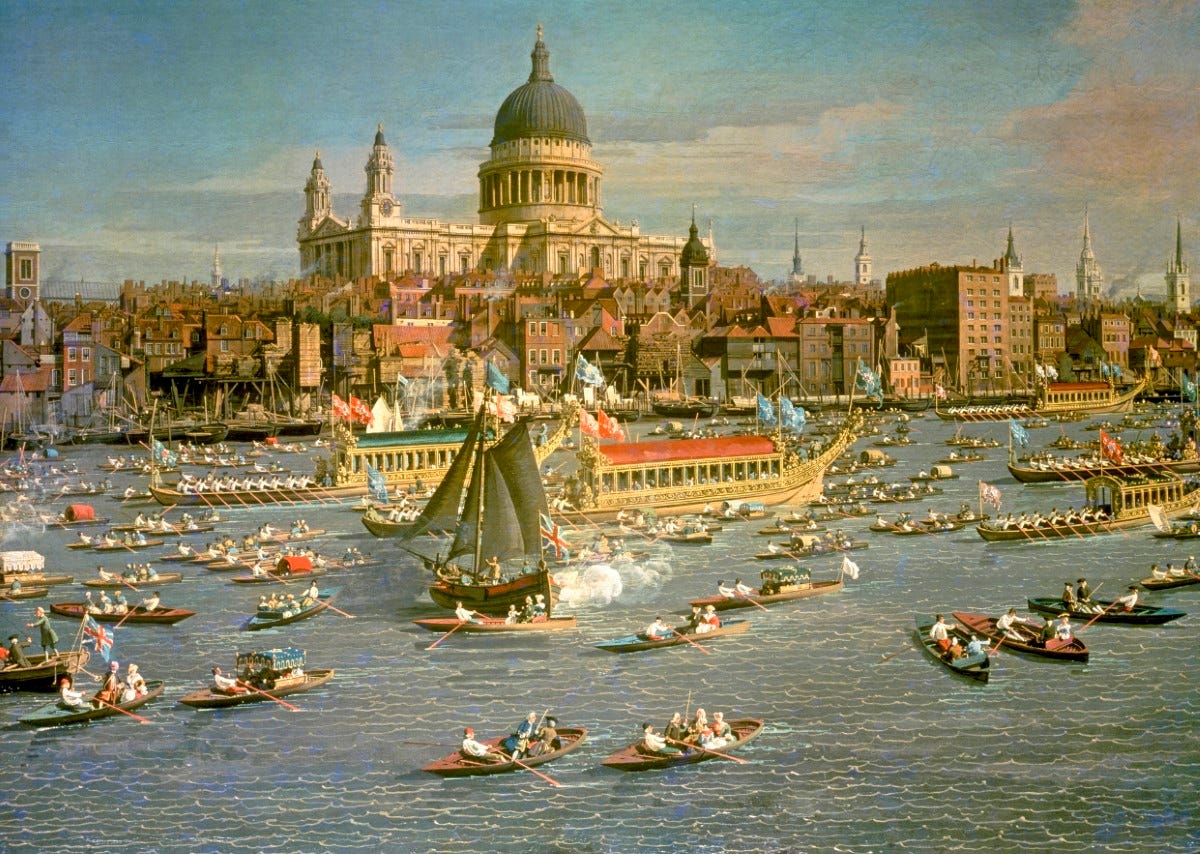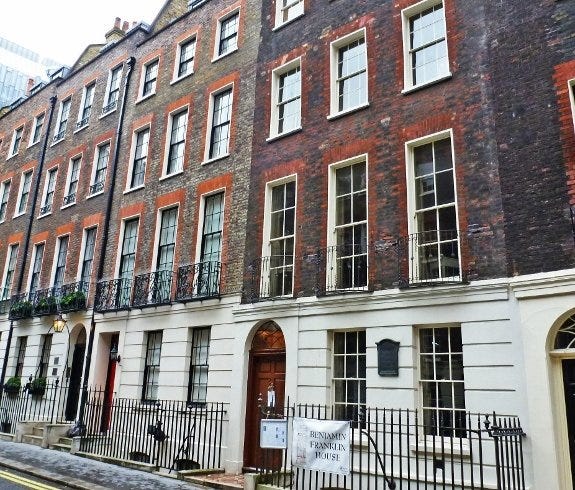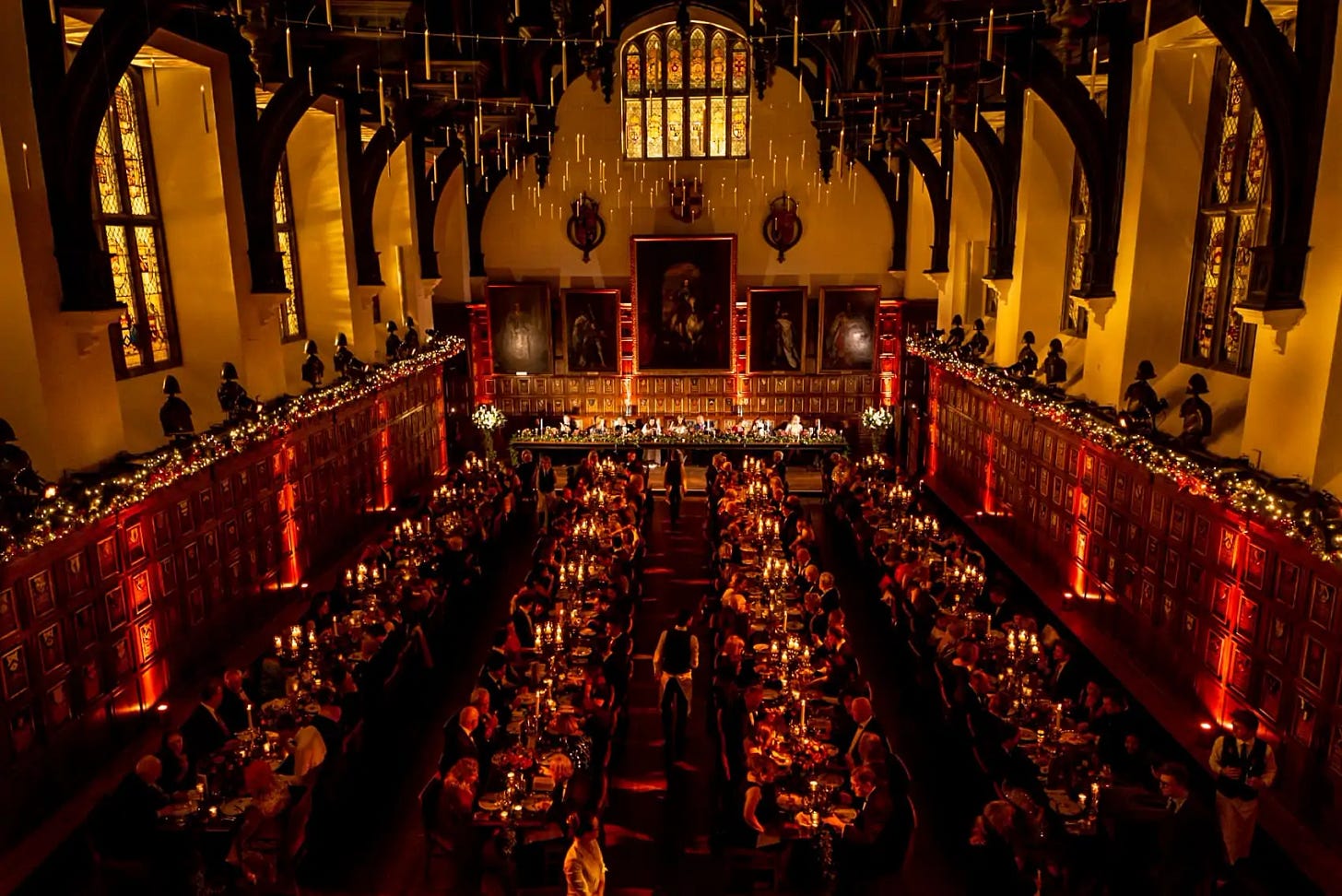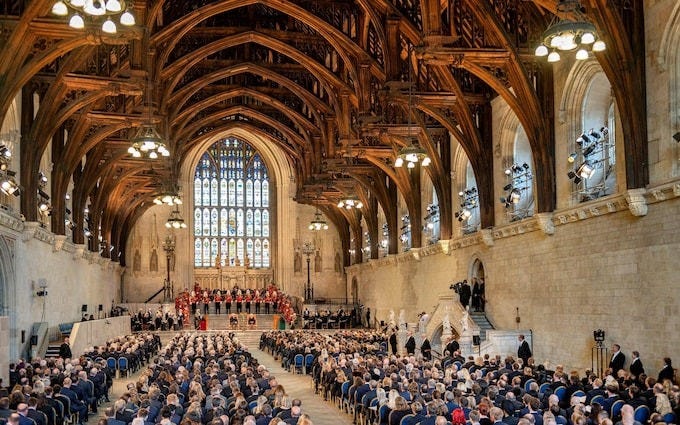
It may seem strange, but it is not the less true, that one great Reason why I from time to time delay’d writing, was the Multiplicity of Things I had to tell you. I knew not to which to give the Preference, and all my Leisure would not permit me to mention. How have I long’d to inform you of the Pleasure I enjoy’d in visiting Windsor, its Castle, and its shady Retreats! Places you yourself recommended to me, and which I have often heard you rapturously speak of, tho’ your Knowledge of them was purely Ideal. The enchanting Scenes at Vauxhall, is another Theme on which I could dwell for Hours together. What would I not have given for a Power of instantaneously transporting you to that delightful Spot! The many agreeable Walks amidst Rows of beauteous Trees lighted with Lamps; the elegant Paintings and Sculpture with which the Boxes, the grand Hall, and Orchestra, are adorn’d; the curious artificial Fall of Water; the ravishing Musick, vocal and instrumental; and the Gaiety and Brilliancy of the Company; would have made you conceive yourself in a Situation beyond even the Elysium of the Ancients.1
The passage above was written by William Franklin on the 9th of December 1757, it is from his first letter to his fiancé, Elizabeth Graeme, since he told her of his arrival in England four and a half months earlier. William had come to London with his father, one of the future founders of the United States of America, Benjamin Franklin, to serve as his clerk and study law. Clearly, he found more than his fiancé and work to occupy his mind, as his rhapsody on his experience of England attests.
Benjamin was appointed as an agent by the Pennsylvanian Assembly to seek redress from the British government for a list of grievances against the colony’s proprietors, the Penn family. In 1681, Charles II granted William Penn 45,000 acres of land. The land was a settlement for a debt of £16,000 owed by Charles to Penn.2 William Penn’s sons, Thomas and Richard, were maligned for controlling the colony of Pennsylvania through cronyism and nepotism and their refusal to pay taxes.3 Benjamin’s mission did achieve some success, and his son succeeded too. William’s time in the mother country was marked by his social and professional ascent. His rise in England changed his life forever.
To induce William to join him in England, Benjamin offered to pay his son’s legal fees and made him the heir and executor of his will. He arranged for William to have a leave of absence from his clerkship and postal job with the Pennsylvanian Assembly. If this was not enough to persuade William to embark on a journey involving a lengthy separation from Elizabeth, Pennsylvanian law requirements for bar candidates may have factored in. Candidates who did not fulfil the requirements of the Inns of Court in London had to undergo a rigorous oral examination in Pennsylvania before the provincial governor, the chief justice, and his associate justices. Given Benjamin’s grievances with the Penns and the tight grip on power this family had on the colony, William’s legal career might have been stymied should he have come before a panel of Penn appointees. William and Elizabeth went public with their engagement before he left for London.4 William Strahan, Benjamin's friend and fellow printer, entered William Franklin’s name in the rolls of the Middle Temple of the Inns of Court.5
Benjamin and William Franklin lived in comfortable lodgings at 7 Craven Street, London, with the widowed Margaret Stevenson and her daughter Polly. The location was convenient for both father and son. Wedged between the fashionable Strand shopping district and the Thames, the house was close to Whitehall, where Benjamin would lobby ministers, and the Middle Temple, where William studied. ‘From his double windows on Craven Street, Benjamin could look out onto the very noisy Hungerford Market, the tradesmens’ shops of the Strand, the rising and falling ship masts on the river. The hurly burly of a hundred different hawkers, the cursing of sedan-chair carriers’.6

William would ‘walk down Middle Temple Lane into the inner courtyards of the tall, ivy coloured Inns of Court, the six centuries old bastion of English law’. Here stood the round church called the Temple, a small replica of the Holy Sepulchre in Jerusalem, famous for its association with Templar knights who went on crusades. Elizabeth I commissioned the Middle Temple Hall and the surrounding buildings and library.7
When he came into the dining hall on the first day of the fall term in 1757, he met an enchanting scene: ‘Flickering candlelight threw shadows against the high, hammer beam ceilings, the stained glass windows imbedded with the coats of arms of famous graduates, the pennants of great men of the law, the portraits of kings and queens by Titian and Van Dyck’.8 William would have sat on a long oak table at the east end of the hall, reserved for those of lower rank, at an institution that hosted the country’s elite.9
The grandeur of William’s new surroundings and opportunities in London did not lead him to neglect the Assembly. On August 20 1757, Benjamin presented his complaints to the Penns on their behalf. The Assembly opposed the distant control of the Lieutenant Governor by the threat of financial penalties. The vetoing of money bills, even at times of emergency, was another cause of resentment, and so was the proprietors refusal to pay taxes, not even for defending the province.10 In this context, William responded to pseudonymous attacks in the press by the Penns. Amid The Seven Years' War or the French and Indian War, as it is called in North America, the Quakers received blame for failing to ensure the colony was sufficiently defended from attacks by the French and native Americans under their charge, and the Pennsylvanian representatives were generally discredited.
On the 16th of September 1757, William wrote a letter that appeared in The London Citizen and The London Chronicle. It was reprinted in The Gentleman’s Magazine and fatefully in The Pennsylvania Gazette, where his fiancé read it.11 His piece addresses the horror of scalpings along the frontier perpetrated by Native Americans. He noted that these atrocities did not occur only in Pennsylvania but in all the American colonies. He defended American troops against accusations of inadequacy. When the Quakers dominated the Assembly, they funded defences with the rest of its members despite their opposition to fighting. William denied that Indians were at the heart of the country, and he said that Pennsylvania had done more than any other colony to defend its frontier, noting forts built and canon purchased. He averred that the dispute between the Penns and the Assembly arose from the insistence of the former on an exemption from taxation. After signing the letter with his real name, William challenged the slanderers to prove their charges.12
In the Loyal Son, Daniel Mark Epstein wrote of William, ‘Manfully he put his name to the paper, and the place where he could be found, the Pennsylvania Coffee-house, as a challenge, so as to put a stop to the anonymous attacks’. No one came forward, Epstein argues that this attests to the success of the strategy. The ‘letter echoed in print all over the English speaking world’.13 Randall said the piece made William ‘somewhat of a celebrity’.14 It bookended his relationship with Elizabeth Graeme.
Elizabeth was the daughter of Dr Thomas Graeme, a prosperous physician and advisor to the proprietors. She lived in Philadelphia. The alignment of the Graeme family and the Penns made politics a source of potential discord between Elizabeth and William.15 In the December 9th 1757 letter, sent by William to Elizabeth, he wrote proudly of the stance he had taken against the Penns.16 In Benjamin Franklin in London, George Goodwin reasons William was careless. He had not written to her in five months, and he combined his comments on the Penns and his letter about them with details of the joyful time he was having in London.17On December 8th 1757, William’s piece on the Penns entered The Pennsylvania Gazette. Increasing tensions between the Assembly and the proprietors must have been the talk of the community in which Elizabeth lived.18
Two months before William’s letter, his fiancé wrote to him, wondering why she had not heard from him since his arrival in England. It seems the relationship was ailing long before another letter she wrote to William after he censured the Penns. Her message, dated 7th May 1758, ended their engagement and condemned him as a ‘collection of party malice’. William received it after returning from a trip to East Anglia.1920 He had promised that the quarrel with the Penns would not come between them and it had. William did hope his counter to the aspersions of the Penns would lead to a positive settlement of the conflict, but Elizabeth was disturbed by the blame he assigned them. She remained loyal to her father’s opinions and the Penn friendship.21 Given the press attacks that impelled William, perhaps she could have been more sympathetic to his retort.22 He was motivated by a sense of principle and duty, loyalty to the Pennsylvanian colonists, and the indignation he shared with his countrymen. Although the couple had not kept a regular correspondence since his arrival in England, Epstein says William was anguished by the breakup. He expressed this in a letter to Margaret Abercrombie and asked her to convey to Elizabeth his acceptance of her decision.23 Goodwin reasons that William was moving on before the split was formalised.‘'Whether it was a conscious decision or not, it seems like he no longer had time for Betsy Graeme.’24 William was ‘at large in the greatest city in the world and was making the most of it’.25
It is not hard to understand Goodwin’s view. The population of London was thirty times larger than William’s home city of Philadelphia. Not only did his new surroundings offer many opportunities and distractions, William won acceptance among the British elite, gaining entry into an aristocratic milieu. Although Benjamin’s scientific eminence connected him to some who had close royal connections, William won favour with the ruling class.26
When Benjamin was ill in 1757, William stood in for his father, met professional needs, and impressed with his charm.27 He was known for his prepossessing qualities, Strahan described William as 'one of the prettiest young gentleman I ever knew’.28 William attended parties at Northumberland House,29 the home of the Earl and Countess of Northumberland.30
William was called to the bar at Westminster Hall on 10th November 1758.31 With his father and Richard Jackson, a respected bencher of the Inner Temple, he worked on An Historical Review of the Constitution and Government of Pennsylvania; this attests to his commitment to the cause for which Benjamin enlisted him.32 The book was released in 1759. Randall regards the work as an attack on prerogative, privilege, and the use of arbitrary power. He judges that no author put their name to the study because it verged on libellous sedition.33 The book sold poorly in England and even Pennsylvania.34
Sometime after 1758, William began courting Elizabeth Downes, the daughter of a wealthy Barbados planter. 'William now had the status of a gentleman and the charm and the skill to move within elevated circles.’35 As his relationship with Downes advanced, so did his career.
This is the fifth part in a series on William Franklin and his loyalism. It has been a long while since part four. Going forward, posts in this series will feature more regularly. I intend that this project will progress to cover the entire American Revolution. A piece that explores the conflict between the Penns and the Pennsylvania Assembly will come in the short to mid-term. So far, the histories I have read do not scratch much beneath the surface of the subject, and the perspective of the Penns seems insufficiently explored.
Click here to read Benjamin Franklin’s British Vision, click here for part one (the prologue) of the series on William Franklin, click here for part two, here for part three, and here for part four.
If you would like to support my work by making a one off donation, click here.
William Franklin to Elizabeth Graeme, 9 December 1757, London, Benjamin Franklin Papers - William Franklin to Elizabeth Graeme - 7:288a, 2005
J. H Elliot, Empires of the Atlantic World, 2006, 212: Editor, William Penn, American Advocate of Peace (1834-1836) Vol. 2, No.11 (December, 1836), pp.115-132, 119
G. B Warden, The Proprietary Group in Pennsylvania, 1754-1764, The William and Mary Quarterly Vol. 21, No. 3 (Jul., 1964), pp. 367-389, 367, 373
William Sterne Randall, A Little Revenge, Benjamin Franklin and his son, 1984, 114-115
Daniel Mark Epstein, The Loyal Son, The War in Ben Franklin’s House, 2017, 50
Randall, 122
Ibid 123
Ibid 125
Ibid 126
George Goodwin, Benjamin Franklin in London, 2017, 87
Epstein, 65
The Papers of Benjamin Franklin, William Franklin to the Printer of The Citizen, Printed in The Gentleman’s Magazine, XXVII (September 1757), 417-18, accessed: 28/10/24
Epstein, 59-60
Randall, 137
Epstein, 42
Ibid, 59
Goodwin, 93
Epstein, 65
Ibid
Ibid
Ibid 59
Goodwin, 92
Epstein, 66
Goodwin, 95
Ibid 93
Ibid 93-95
Sheila Skemp, Benjamin and William Franklin: Father and Son, Patriot and Loyalist, 1994, 33: Goodwin, 56
Randall, 129
Skemp, 31
Goodwin, 95
Epstein, 65
Randall, 134
Ibid, 137, 138
Goodwin, 127
Ibid, 139






